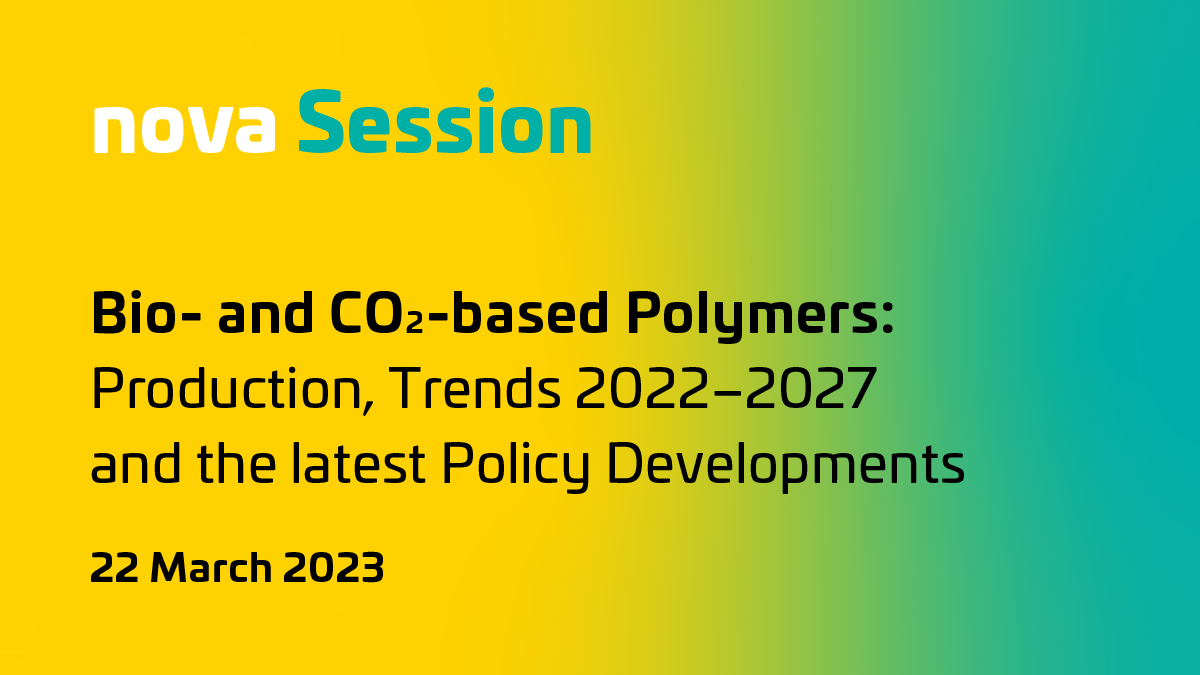Deep insights into bio- and CO₂-based solutions for polymers
nova Session “Bio- and CO₂-based Polymers: Production, Trends 2022-2027 and the latest Policy Developments” - Workshop with nova experts from technology and markets, sustainability and policy
The nova-Institute invites interested parties to the nova session “Bio- and CO2-based Polymers: Production, Trends 2022-2027 and the latest Policy Developments” on 22 March 2023 (https://events.renewable-carbon.eu/polymer-session/). The full-day workshop will take place as a hybrid event in the nova office in Hürth and online.
The workshop will focus on the market report “Bio-based Building Blocks and Polymers –Global Capacities, Production and Trends 2022-2027” and the trend report “Carbon Dioxide (CO2) as Feedstock for Chemicals, Advanced Fuels, Polymers, Proteins and Minerals – Technologies and Market, Status and Outlook, Company Profiles”, which will be published in February and March 2023 (https://renewable-carbon.eu/commercial-reports). Participants of the session will receive a 15% discount for purchasing the market and trend reports.
Topics of the session include:
- Renewable Carbon
- Mass Balance and Free Allocation (MBFA)
- Market Overview of and Deep Dive into Bio-based Building Blocks and Polymers
- Technology and Trends Overview of CO2-based Building Blocks and Polymers
- CCU: Much more than a Carbon Removal Strategy
- Policy: Packaging and Packaging Waste Regulation, Policy Framework on bio-based, biodegradable and compostable plastics
The main authors of the report will participate in the workshop and discuss with you. The nova session offers the unique opportunity to exchange information about current market, technology and policy developments at the highest level.
Book your on-site or online event for 545 or 495 EUR (excl. 19% VAT) here https://events.renewable-carbon.eu/polymer-session/registration/.
The session will deal with the developments of bio- and CO2-based polymers and building blocks: Bio-based polymers are estimated to grow at a CAGR of 14% from 2022 to 2027. Some examples: Bio-based epoxy resin production is on the rise, PTT regained attractiveness after several years of constant capacities and PE and PP made from bio-based naphtha are being further established with growing volumes. Increased capacities for PLA are ongoing, after being sold out in 2019. Current and future expansions for bio-based polyamides as well as PHAs are on the horizon. And also, bio-based PET is getting back in the game.
Additionally, the use of CO2 as chemical feedstock for building blocks and polymers has been intensively diversified. Several successfully implemented technologies used at a commercial level are in place and many more at the laboratory and pilot phase. Besides the long-established use of CO2 for the synthesis of polycarbonates, also polyurethanes are based on it. The most notable biotechnological conversion pathway of a syngas produces ethanol at commercial scale. Additionally, high interest is also observed in CO2-based methanol and in CO2-based hydrocarbons, which can be used for fuel, chemical and polymers applications. A current total production capacity of these CO2-based products of ca. 1.3 Mt/a in 2022 is observed and a strong increase in capacity is expected by 2027.
The EU policy landscape has seen significant updates in the final weeks of 2022 with the proposed Packaging and Packaging Waste Regulation and the publication of the Policy Framework on bio-based, biodegradable and compostable plastics. How these updates may affect CO2 and bio-based polymers will be addressed in the session.
Find the full program here: https://events.renewable-carbon.eu/polymer-session/program/.
About nova-Institute
nova-Institute is a private and independent research institute, founded in 1994; nova offers research and consultancy with a focus on the transition of the chemical and material industry to renewable carbon: How to substitute fossil carbon with biomass, direct CO2 utilisation and recycling. We offer our unique understanding to support the transition of your business into a climate neutral future.
Source:
nova-Institute, press release, 2023-02-23.

